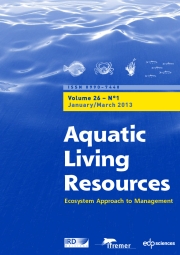Article contents
Marine heterotrophic bacteria associated with enrichment culture of nitrifying bacteria planned for closed aquaculture systems
Published online by Cambridge University Press: 15 April 1992
Abstract
Ammonium and nitrite oxidizing bacteria were enriched in separate cultures using a primary inoculum of water from an enclosed shrimp rearing facility. Each enrichment was continued by transfer to increasing volumes of medium up to 151. Seventy four strains of heterotrophic bacteria were isolated; seventeen from each primary inoculum, and twenty from each of the 151 enrichments at the time when all the ammonium or nitrite had been utilized. All the isolates, described by 101 characters, were subjected to numerical taxonomy. During the enrichment for ammonium oxidizers, a strong selective pressure led to the disappearance of some strains, mostly enterobacteria. Two taxonomic groups composed of pseudomonads and asporogenous Gram positive rods were associated with the ammonium oxidizers. The population was characterized by an inability to use amino acids as carbon and energy sources. In contrast, the strains associated with nitrite oxidizers were able to use all the carbon and energy sources tested. Many of these strains were Gram positive, asporogenous aerobic rods, others were Gram negative pseudomonads.
Keywords
- Type
- Research Article
- Information
- Copyright
- © IFREMER-Gauthier-Villars, 1992
- 4
- Cited by


